- About Us
- Cell Therapy
- Neurology
- Disorders
- Services
- All Therapies
- Regenerative Rehabilitation
- Rehabilitation for Stroke
- Rehabilitation for Spinocerebellar Ataxia
- Parkinson’s Disease Rehabilitation
- Multiple Sclerosis Rehabilitation
- Rehabilitation for Spinal Cord Injury
- Rehabilitation for Motor Neuron Disease
- Rehabilitation for Cerebral Palsy
- Brachial Plexus Injury rehabilitation
- Rehabilitation for Global Developmental Delay
- Childhood Disorders Clinic
- Outpatient Services
- Ask a question
- Request an appointment
- About Us
- Cell Therapy
- Neurology
- Disorders
- Services
- All Therapies
- Regenerative Rehabilitation
- Rehabilitation for Stroke
- Rehabilitation for Spinocerebellar Ataxia
- Parkinson’s Disease Rehabilitation
- Multiple Sclerosis Rehabilitation
- Rehabilitation for Spinal Cord Injury
- Rehabilitation for Motor Neuron Disease
- Rehabilitation for Cerebral Palsy
- Brachial Plexus Injury rehabilitation
- Rehabilitation for Global Developmental Delay
- Childhood Disorders Clinic
- Outpatient Services
- Ask a question
- Request an appointment
What to know about Autoimmune Conditions like Rheumatoid Arthritis | Psoriasis | Lupus
Your immune system protects you from diseases and infections by attacking foreign elements that get into your body. However, if you have an autoimmune disease, your immune system attacks the healthy cells of your organs and tissues by mistake. Get the best treatment from world-renowned cell expert Dr Na’eem Sadiq for your autoimmune condition today.
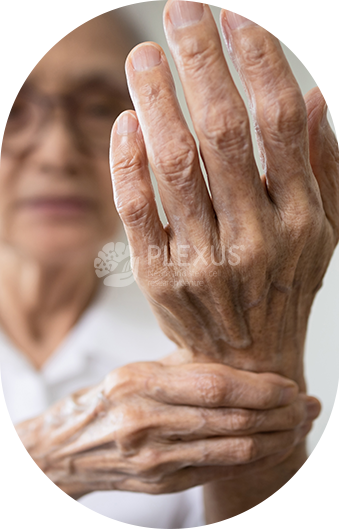
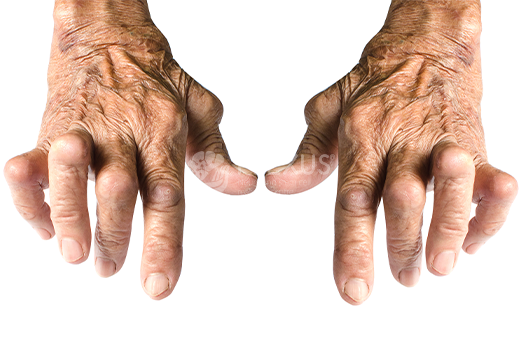
Understanding Autoimmune Conditions
Imagine that your body is a fortress, while your immune system is your army fighting off invaders like bacteria and viruses. Now if your army malfunctions and attacks your own fortress, then it might become a huge problem. Similarly, the immune system can tell the difference between foreign cells and your own cells. In autoimmune conditions, the immune system mistakes part of your body, like your joints or skin, as foreign. It releases proteins called auto-antibodies that attack healthy cells.
Types of Autoimmune Diseases
Autoimmune diseases of joints and muscles
Rheumatoid Arthritis
- Immune system attacks the joints
- Symptoms: soreness, stiffness, redness, and warmth in joints
Psoriasis
- Skin cells multiply at a rapid pace leading to extra build-up
- Symptoms: inflamed, red/purple patches with silver white/brown/gray scales all over the body
30% of psoriasis patients also experience swelling, stiffness, and pain in their joints. This condition is called psoriatic arthritis.
Autoimmune diseases of joints and muscles
Systemic Lupus Erythematosus (SLE)
- Affects joints, kidneys, heart, brain, among other organs
- Earliest symptoms: Rashes
Sjörgen’s Syndrome
- Affects glands that secrete lubrication for the eyes and mouth
- Symptoms: Dry mouth, dry eyes, dry skin, muscle/joint pain, rashes, fatigue, vaginal dryness
Autoimmune diseases of the nervous system
Myasthenia Gravis
- Disrupts nerve impulses that help the brain to control muscle and movement
- Symptoms: Drooping eyelids, speech trouble, dysphagia, double vision, limb weakness, inability to hold neck up
Multiple Sclerosis
- Attacks the central nervous system by damaging the myelin sheath
- Symptoms: Fatigue, vision problems, numbness, tingling, muscle weakness, osteoporosis
Autoimmune diseases of the skin
Dermatomyositis
- Affects skin and weakens muscle
- Type of myopathy
- Leads severe respiratory problems
- Symptoms: Dysphagia, reddish purple skin, shortness of breath, stiffness, weakness, soreness
Psoriasis
- Skin cells multiply at a rapid pace leading to extra build-up
- Symptoms: inflamed, red/purple patches with silver white/brown/gray scales all over the body
30% of psoriasis patients also experience swelling, stiffness, and pain in their joints. This condition is called psoriatic arthritis.
Autoimmune diseases of the digestive tract
Inflammatory Bowel Disease (IBD)
- Inflammation along the lining the intestinal wall
- Symptoms: Diarrhoea, rectal bleeding, fever, weight loss, anaemia, abdominal pain, malnutrition and delayed growth (in children)
Crohn’s disease - inflammation along any part of the GI tract (from mouth to anus)
Ulcerative colitis - inflammation along the lining of the large intestine and rectum
Celiac Disease
- Attacks small intestine
- Triggered by gluten
- Symptoms: diarrhoea/ constipation, recurrent stomach ache, cramping, bloating, anaemia, fatigue, nausea, vomiting, folic acid deficiency
Autoimmune diseases of the endocrine system
Graves’ Disease
- Attacks the thyroid gland
- Results in hyperthyroidism
- Symptoms: Mood swings, fatigue, irregular heartbeat, weight loss, profuse sweating, frequent bowel movements
Hashimoto’s Thyroiditis
- Slows down the secretion of thyroid hormone
- Leads to hypothyroidism
- Symptoms: Mild weight gain, constipation, dry skin, lethargy, joint stiffness, muscle pain, bradycardia
Autoimmune diseases of the endocrine system
Addison’s Disease
- Attacks the adrenaline glands
- Disrupts production of cortisol, aldosterone, and androgen hormones
- Symptoms: Lethargy, muscle weakness, irritability, unintentional weight loss, salt cravings, increased thirst
Other autoimmune diseases
Type 1 Diabetes
Autoimmune Vasculitis: Caused by inflammation that narrows veins arteries
Pernicious Anaemia: Disturbs stomach’s lining, leads to vitamin B12 deficiency
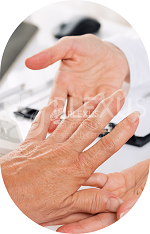
Symptoms of Rheumatoid Arthritis
Dry eyes and mouth may also be indicative of Sjögren’s Syndrome, an autoimmune condition that attacks the glands that secrete lubrication for the eyes.

Joint pain

Joint swelling

Joint deformities
Systemic symptoms (weight loss, fever, dry eyes and mouth)

Fatigue

Morning stiffness

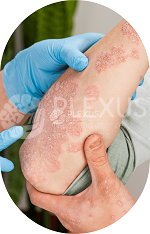
Psoriasis is a common relapsing disease that occurs when the overactive immune system speeds up skin cell growth. Normally, the skin cells completely grow and shed (fall off) in a month. However, in case of individuals with Psoriasis, the skin cells do this in only three or four days. This causes the cells to pile up on the surface of the skin.
The condition is commonly characterized by skin lesions, red scaly patches, papules, and plaques. Although plaques and scales may appear on any part of the body, they are usually found on the elbows, knees, and scalp.
Symptoms of Psoriasis

Joint pain


Nail changes (pitting, discolouration, and separation from nail bed)

Red, raised patches covered with silvery-white scales

Itching and discomfort around patches
Systemic Lupus Erythematosus (SLE), also known as Lupus, is a chronic inflammatory condition. It can damage the skin, joints, kidneys, brain, lungs, blood cells, and multiple organs and systems in the body. Its most common triggers include stress, infections, as well as frequent exposure to ultraviolet (UV) light.
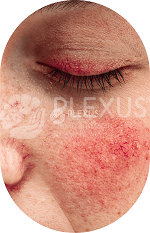
Symptoms of Lupus
Dry eyes and mouth may also be indicative of Sjögren’s Syndrome, an autoimmune condition that attacks the glands that secrete lubrication for the eyes.

Ulcers in nose mouth

Skin rashes

Joint pain
Fever

Fatigue

Headaches

Seizures

Cognitive dysfunction

Inflammation in kidney (nephritis), heart (pericarditis), or lungs (pleuritis)

Fingers and toes turning blue or white in cold or when stressed, also known as Raynaud’s Phenomenon
Causes of Autoimmune Conditions
Researchers are still unaware of the exact causes of autoimmune conditions and why the immune system turns on individuals. However, the conditions often do tend to run in families. This means that certain genes may make some people more likely to develop these conditions. Additionally, viruses, certain chemicals, and other elements in the environment may trigger autoimmune conditions if an individual has the genes for it.

Treatments for Autoimmune Conditions
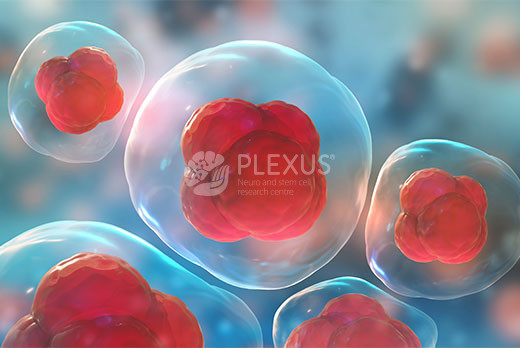
Cell Therapy
Cell therapy is emerging as one of the most promising tools for promoting tissue repair and protecting from damage caused by immune attacks in autoimmune conditions. Cells mediate immune modulation and suppression of inflammation.
Our treatment program at Plexus
At Plexus, our expert team provides treatments for Rheumatoid Arthritis, Psoriasis and Lupus.
Our Cell Therapy has yielded promising results for treatment of Rheumatoid Arthritis in our patients. Dr Na’eem Sadiq and his experienced team extract and administer cells to find and repair damaged tissue throughout the body. The regenerative properties of the cells help to repair damaged tissue to reduce pain and increase mobility. This effect can be attributed to the anti-inflammatory properties of mesenchymal cells.
At Plexus, we have achieved tremendous success in treating Psoriasis using Cell Therapy. Our experts use Cell Therapy to target the defective cells that produce the cells that lead to plaque formation. The regenerative properties of the cells help to repair damaged tissue to reduce pain and increase mobility. Additionally, our treatment methods help in the complete remission of lesions, leaving the skin without any marks or traces
If you wish to know about other autoimmune conditions, please click on the link below.
What our patients say

Anjali (name changed)
"I underwent Cell therapy for my psoriatic rash, as I used to get frequent flare ups and rashes. After undergoing treatment at Plexus, the frequency of my flare ups has reduced and they are less severe as compared to before. I am very happy with my progress. Thank you Plexus team.”

Pooja Mishra (name changed)
“For the last 10 years, I have visited many hospitals in search of the best treatment for Multiple Sclerosis. While some doctors said I cannot be cured completely, others did not even try. Finally, I came to Plexus for my treatment. All thanks to Dr Na’eem, I am absolutely fine now."
FAQs answered











